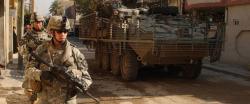 |
 |
Time: Iraq’s Sectarian Violence: Bombings Plunge Country Into Deadly Spiral

Read the article at Time
Monday’s bombings are just the latest in what has been a bloody spring in Iraq. According to a tally by the Associated Press, there have been 20 days with at least one car bomb or militant attack since the New Year. According to the U.N. Assistance Mission in Iraq, 712 people died in April, the deadliest month in the country since 2008. So far, no one has taken responsibility for the most recent attacks. They come amid fears that Syria’s deadly civil war is reverberating in the wider region, as Sunni-Shi‘ite proxy wars flare up in both Lebanon and Iraq.
But the bombings in Iraq appear to be caused first and foremost by domestic sectarian and political rifts. They come after months of conflict and discord between the Shi‘ite-led government and minority Sunnis, as well as territorial disputes between the government in Baghdad and the largely self-governing Kurds in Iraq’s north.
The waves of bombings and sectarian attacks invoke memories of 2006–07 when post–Saddam Hussein Iraq devolved into a sectarian war. “You often hear people saying, Is it 2006 again?” says Stephen Wicken, a research analyst at the Institute for the Study of War in Washington, D.C., who authors the think tank’s weekly Iraq updates. Wicken thinks Iraq’s current security situation better mirrors the early days of the U.S. occupation, when American troops were often at the center of the country’s escalating violence. “Other people are saying, No, it’s 2003 again, which is probably closer to the mark, actually, in terms of security forces acting as bullet magnets in the way that coalition forces did a decade ago,” he says.
The latest rash of sectarian strife began nearly six months ago, when the Shi‘ite-dominated government’s security forces raided the home of Sunni Finance Minister Rafia al-Issawi. After al-Issawi’s arrest, antigovernment protests sprang up in Anbar, Nineveh and Salah ad-Din provinces, and converged in Ramadi, which was the scene of intense fighting for years during the American occupation.
In April, security forces clashed with protesters and Sunni gunmen in the northern city of Hawija, leaving dozens dead, most of whom were Sunni. Like many engagements, there were differing reports over who incited the violence, which led to outrage and a string of retaliatory attacks. There are claims that militant groups in Hawija baited the security forces in an attempt to force people to choose sides and push the sectarian groups back into open conflict. “The floor’s the limit, so to speak,” Wicken says of sectarian tensions following the Hawija clash. “The majority of the ways this can go are profoundly negative ones.”
Copyright © 2013 Time Inc.